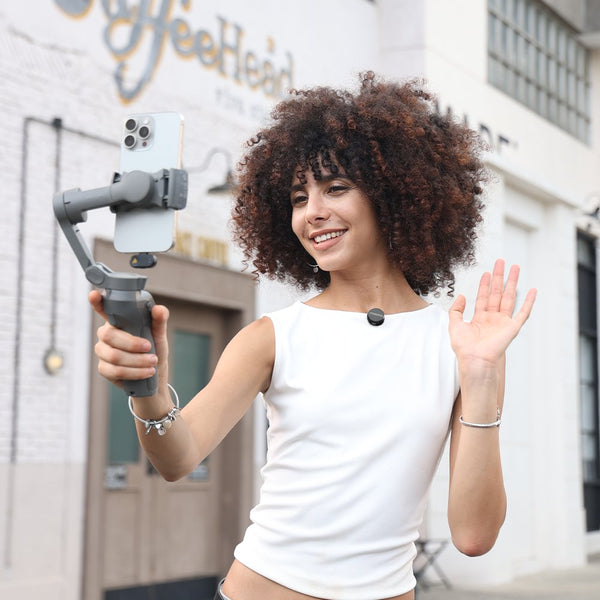The world of dubbing training is a fascinating realm where voices bring characters to life and stories unfold with captivating narratives. Yet, behind every successful dubbing artist lies a carefully crafted setup, and at the heart of it is the dubbing microphone essential for a dubber job. In this comprehensive guide, we'll take you on a journey through the intricacies of microphones for dubbing and how Maono can empower you to excel in your dubbing career.

A dubbing microphone, often referred to as a dubbing mic, is a specialized type of microphone used in the field of audio dubbing and voice recording. It is specifically designed to capture voice performances with exceptional clarity, detail, and accuracy.
Also Read: How to Land a Client for Voice Over Work
What is a Dubber Job?
Dubbing is the process of replacing or supplementing the original spoken language of a film, television show, animation, or other audio-visual content with a different language or voiceover. A professional dubbing microphone plays a crucial role in this process by capturing the nuances of the voice actor's performance, ensuring that the new dialogue seamlessly matches the lip movements and emotions of the original characters.
Becoming a dubbing artist involves a combination of talent, training, practice, and networking. A dubber job involves a dubbing artist who provides voiceovers for various media, such as films, TV shows, video games, and advertisements. Dubbing artists replace the original dialogue with new recordings in a different language or match the original language with a different voice to enhance the audio experience for viewers.
Why Dubbing Training Is Essential for Aspiring Voice Artists
Dubbing training is a crucial step for anyone aspiring to become a professional voice artist, as it teaches specialized skills like lip-syncing, timing, and emotional modulation. Unlike standard voice over training, where narration is performed independently, dubbing demands precise coordination between sound and visuals. Through formal dubbing classes online or a voice acting course, artists learn to control their pronunciation, tone, and emotional delivery to ensure that performances feel natural and believable.
Structured programs, such as a dubbing course for beginners or a professional dubbing workshop, focus on essential skills like rhythm, sync accuracy, and character emotion. Many students also learn dubbing techniques through online platforms such as Voices.com Training Center, Gravy for the Brain, and Edge Studio Voice Acting Classes. These courses help build technical proficiency while microphone practice enhances recording control and clarity — key elements for mastering the art of dubbing in today’s competitive voice industry.
How to Practice Dubbing at Home While Taking Dubbing Training
Practicing dubbing at home is an excellent way to reinforce what you learn during formal dubbing training. Start by recording your voice using a high-quality USB microphone to ensure clear and professional audio.
Choose short movie or anime clips, mute the original dialogue, and try to sync your voice precisely with the character’s lip movements, focusing on timing and emotion.
Next, use audio editing software such as Audacity or Adobe Audition to analyze your pronunciation and clarity, making adjustments where needed. Incorporate daily vocal warmups—like pitch glides, breathing exercises, and tone control—to strengthen your vocal range and flexibility. With consistent practice, you’ll develop better tone, pitch, and emotional delivery, helping you sound more natural and confident as a dubbing artist.
How to Become a Dubbing Artist: Perfect Microphone Setup
Becoming a successful dubbing artist requires a blend of vocal skill, acting ability, and the right technical setup. While honing your voice and mastering lip-sync are essential, your microphone setup can make or break your recordings. A quality condenser or dynamic mic paired with a reliable pop filter and proper placement ensures crisp, clear audio that captures every nuance of your performance. Soundproofing your recording space and using an audio interface with low latency further enhances quality, making your voice sound professional and broadcast-ready. With the right gear and technique, you can bring characters to life and stand out in the competitive dubbing industry.
A successful dubbing career requires more than just a good voice — it demands skill, the right tools, and industry knowledge. Whether you’re aiming to become a professional voice over artist or want to expand into offering voice acting services, having the right setup is essential.
Daily Responsibilities of a Dubbing Artist:
If you’re curious, here are the daily responsibilities of a Dubbing artist:
- Voice Recording: Perform voiceovers for characters, narrations, or commercials, ensuring emotional alignment with the content.
- Script Interpretation: Understand and interpret scripts to convey the appropriate tone and emotion.
- Syncing Dialogue: Match voice recordings to the timing of the on-screen actions, ensuring lip-sync accuracy.
- Collaboration: Work closely with directors, producers, and sound engineers to achieve the desired final product.
- Editing: Sometimes involved in editing their recordings or providing feedback on the final mix.
- Recording Sessions: Performing voiceovers in a soundproof studio, ensuring timing aligns with the visual content.
- Revisions and Retakes: Re-recording lines to improve delivery or fix timing issues.
- Practicing Voice Techniques: Regularly practicing to enhance vocal range, stamina, and emotional delivery.
Skills Required:
The skills required for a dubber job are the following:
- Voice Control: Ability to modulate voice tone, pitch, and pace to suit different characters or contexts.
- Language Proficiency: Strong command of the language being dubbed, including accents and dialects if applicable.
- Acting Skills: Ability to portray emotions convincingly and bring characters to life.
- Technical Knowledge: Understanding of audio equipment and recording software, especially for home studio setups.
- Attention to Detail: Keen ear for nuances in dialogue and sound, ensuring high-quality recordings.
- Diction and Clarity: Pronouncing words clearly and correctly ensures the audience understands the dialogue.
- Timing and Synchronization: Matching voice recordings precisely with the on-screen movements and lip-sync.
- Patience and Focus: Recording sessions can be long and repetitive; perseverance and attention to detail are crucial.
In summary, a dubber job requires a blend of vocal talent, acting ability, and technical skills, making it an exciting and dynamic career in the entertainment industry.
Having discussed the skills and daily responsibilities of a dubbing artist, we now have an idea of how important good quality audio equipment is.
Essential Gear Every Dubbing Artist Needs or Mic Setup Tips for Aspiring Dubbing Artists
For aspiring dubbing artists, having the right gear is just as important as vocal talent. Start with a high-quality condenser microphone for capturing detailed, natural voice tones, paired with a pop filter to reduce plosive sounds. An adjustable mic stand keeps your setup comfortable and consistent, while a reliable audio interface ensures clean, low-latency recordings. Don’t forget a well-treated recording space with acoustic panels or foam to eliminate echo and background noise. With the right mic setup, you’ll deliver crisp, professional-quality audio that makes your voice shine in every project.
Importance of Good Audio Equipment
High-quality audio equipment is essential in a dubber job to:
1. Deliver Professional Sound Quality
- A good microphone, like a condenser microphone, ensures every detail of the voice is captured.
2. Minimize Background Noise
- Professional-grade equipment reduces unwanted noise for clean, crisp audio.
3. Save Time in Post-Production
- Accurate initial recordings reduce the need for heavy editing or retakes.
4. Enhance Overall Performance
- Reliable headphones and microphones allow dubbers to monitor their recordings in real time, ensuring better synchronization and clarity.
By using top-tier equipment and applying skills from your voice acting course, you can produce studio-quality results that captivate audiences.
Job Market Insights for Dubbing Jobs:
There’s increasing demand for dubbing artists worldwide, driven by streaming platforms like Netflix, Disney+, and Amazon Prime that localize content into multiple languages. This boom has made dubbing classes online and professional dubbing workshops more popular than ever, helping newcomers enter the market with solid foundations.
Dubbing artists can work in film, gaming, animation, advertising, and even educational content. Freelancers enjoy flexibility, while full-time studio work offers stability and long-term collaboration.
Potential Job Opportunities
A dubber job offers diverse career paths, from working in animation and video games to dubbing films, TV shows, and audiobooks. You can choose between freelance and full-time roles. Freelancers have the flexibility to work on various projects and set their rates, while full-time positions with studios or production companies provide stability and consistent income. Earnings for a dubber job vary widely, with beginners earning around $20-$50 per hour, while experienced dubbers can command rates of $100 or more per hour. The potential for growth is significant as you gain experience and build a reputation in the industry.
- Film and Television: Dubbing artists often find opportunities in studios that specialize in localizing foreign films and series.
- Video Games: The gaming industry is a major employer of dubbing artists, requiring voiceovers for character dialogues and in-game narratives.
- Advertising: Many companies seek dubbing artists for commercials, especially for campaigns targeting multilingual audiences.
- Animation: Animated films and series frequently require dubbing for different languages, presenting more opportunities for voice actors.
- Corporate and Educational Videos: As businesses create training and promotional materials, dubbing artists may be hired to provide voiceovers.
Industry Trends
- Increased Localization: As global media consumption grows, the trend toward localized content continues, leading to more dubbing jobs.
- Technological Advancements: Innovations in audio technology and software are making it easier for artists to record high-quality voiceovers from home, expanding opportunities for freelancers.
- Diverse Content: The rise of diverse narratives and cultures in media is creating demand for dubbing artists who can authentically represent various accents and languages.
- Remote Work: The COVID-19 pandemic accelerated the trend of remote work, allowing dubbing artists to work from home studios and collaborate with teams around the world.
To summarize, the job market for dubbing artists is robust, with increasing demand and a variety of opportunities across different media formats. As the industry continues to evolve, aspiring dubbing artists can find numerous paths to build their careers.
You already know the growing demand for a dubbing artist, now let's explore some quick tips to find your dream dubbing job.
Tips for Finding Dubber Jobs:
1. Build a Strong Portfolio:
Create a demo reel showcasing your voice range and styles. Include samples relevant to dubbing to attract potential employers.
2. Join Online Platforms:
Sign up for freelance websites like Voices.com, Fiverr, and Upwork, where many dubbing jobs are posted. Optimize your profile with relevant keywords.
3. Utilize Social Media:
Use platforms like LinkedIn, Instagram, and Twitter to connect with industry professionals. Share your work, join voice acting groups, and engage with related content.
4. Network at Industry Events:
Attend voice acting workshops, conventions, and local meetups to meet other dubbing artists, directors, and producers. Networking can lead to job opportunities.
5. Research Dubbing Studios:
Identify dubbing studios and agencies that align with your skills. Reach out to them directly with your portfolio and express your interest in opportunities.
6. Audition Frequently:
Actively seek and apply for auditions on dedicated websites and social media groups. Regularly auditioning increases your chances of landing a job.
7. Stay Updated on Industry Trends:
Follow industry news and trends to understand where demand is growing. This knowledge can help you position yourself effectively.
Taking these steps, one can increase chances of finding dubber jobs and advancing one's career in the dubbing industry.
8. Practice Voice Exercises Daily:
Always warm-up your voice by simple humming or lip trills to prepare your vocal cords. Practice tongue twisters to sharpen clarity and enunciation. Also practice breathing exercises regularly, help maintain steady airflow for longer recordings.
9. Invest in Reliable Audio Equipment:
- Get a Quality Microphone: A condenser microphone is perfect for beginners in voice-over and dubbing work, offering superior sound quality for clear recordings.
Your microphone is your primary connection to your audience. For dubbing, a voice acting microphone ensures you capture every nuance, emotion, and inflection. Many beginners mistakenly use generic mics, but a good microphone for voice acting will offer clarity, low noise, and a warm, natural tone.
- Set Up a Home Studio: Use a pop filter, soundproofing, and quality headphones to create a professional recording space.
- Test Your Gear: Ensure consistent audio quality to impress directors and clients.
Breaking into dubbing requires commitment, daily practice, and professional-grade tools. Start small, stay consistent, and let your voice open doors to a rewarding career.
Also, here's a brief overview of the steps to becoming a successful dubbing artist:
Steps to Becoming a Successful Dubbing Artist
1. Develop Your Voice
Start by honing your vocal skills Practice enunciation, modulation, pitch variations, and emotional expression. A versatile voice is crucial for adapting to different characters and genres.
2. Voice Training
Consider formal voice training or acting classes. These can help you understand vocal techniques, improve breath control, and learn how to convey emotions effectively through your voice.
3. Language Proficiency
Fluency in multiple languages is a major asset for dubbing artists. If you're interested in dubbing for languages other than your native tongue, work on your language skills to ensure accurate pronunciation and natural delivery.
4. Understand Lip Sync
Learn how to sync your voice with the lip movements of the original character. This requires timing, precision, and the ability to convey emotions within the constraints of lip sync.
5. Recording Techniques
Familiarize yourself with dubbing microphone setup and techniques. Understand how to use dubbing microphones, pop filters, and recording software to capture high-quality audio.
6. Build a Demo Reel
Create a demo reel showcasing your vocal range and acting abilities. Include samples of various characters and emotions to demonstrate your versatility.
7. Networking
Attend workshops, seminars, and industry events to connect with professionals in the dubbing and entertainment industry. Networking can open doors to potential opportunities.
8. Auditions
Keep an eye out for dubbing auditions. Many studios and production companies hold auditions for voice artists. Submit your demo reel and attend auditions to showcase your skills.
9. Continuous Learning
The industry evolves, and new techniques and technologies emerge. Stay updated by attending workshops, taking additional training, and adapting to industry trends.
10. Online Presence
Create an online presence through social media platforms and personal websites. Share your work, connect with fellow professionals, and showcase your expertise.
11. Persistence
Breaking into the dubbing industry can be competitive, and success may not come overnight. Be persistent, patient, and open to feedback for continuous improvement.
Remember that becoming a dubbing artist requires dedication and a genuine passion for the craft. It's a rewarding journey that allows you to bring characters to life and contribute to the entertainment industry in a unique way.
--- Dubbing Microphone Setup ---
Crafting your dubbing sanctuary is essential for impeccable sound quality. Your dubbing microphone setup forms the backbone of your studio. Maono offers a plethora of microphone options tailored for dubbing like PM422, ensuring your voice is captured with pristine clarity and depth.
But it's not just about the dubbing microphone. Think microphone stands, shock mounts, and pop filters – all designed to minimize vibrations and plosive sounds, ensuring your recordings are nothing short of professional.

--- Affordable Brilliance ---
Don't let a tight budget dampen your dubbing aspirations. Maono understands that greatness shouldn't come at a steep price. The MAONO PM325T 3.5MM Condenser Microphone is the best budget microphone for dubbing your gateway to exceptional dubbing quality without breaking the bank. Complete with a professional condenser microphone, shock mount, pop filter, and more, this kit equips you with the tools needed to embark on your dubbing journey.

--- Unleash Your Creativity Anywhere ---
Flexibility is the hallmark of a modern dubbing artist. Whether you're in your dedicated studio or on the move, Maono also provides dubbing microphones for iPhones, ensuring you can capture your voice with remarkable clarity even outside your studio walls. Elevate your dubbing game by exploring unconventional recording locations and never miss a moment of creative inspiration.
--- Elevating Your Artistry ---
For those who have already embarked on their dubbing odyssey and seek to reach new heights, Maono presents PM500 Studio-Quality XLR Microphone designed to infuse your performances with unparalleled quality. The uniquely designed professional dubbing microphone boasts a high-resolution condenser capsule that faithfully reproduces the nuances of your voice, adding a cinematic touch to your dubbing artistry.

--- Resonating with the Reddit Community ---
Delve into online communities like Reddit, and you'll find a chorus of recommendations for Maono's dubbing microphones. Fellow dubbing artists have lauded these microphones for their exceptional sound quality and versatility. The resonance these microphones have found within the Reddit community speaks volumes about their effectiveness in elevating dubbing performances.
Tips for Aspiring Dubbing Artists: Skills, Demo Reels, Studio Setup & Job Opportunities
A successful dubbing artist blends vocal mastery with technical know-how and industry savvy. Start by developing your vocal skills through acting classes, which improve emotional delivery, and practice voice modulation, character adaptation, and breath control to maintain consistent performance across long sessions. Next, create a professional demo reel showcasing diverse character voices, strong lip-sync skills, and clean, well-edited audio—this is your calling card for casting directors. Set up a home studio with proper soundproofing, acoustic treatment, and reliable recording software like Audacity or Reaper to ensure broadcast-quality sound. Finally, seek opportunities through talent agencies, online platforms such as Voices.com and VOPEER, and niche dubbing communities, where regular auditions can help you land consistent work in this competitive field.
Frequently Asked Questions about Dubber Jobs:
1. What qualifications do I need to become a dubbing artist?
While there are no formal qualifications required, a background in acting, voice training, or linguistics can be beneficial. Many successful dubbing artists take voice acting classes, participate in workshops, and practice regularly to hone their skills. A strong command of the language being dubbed, including accents and pronunciation, is also essential.
2. What career paths are available for dubbing artists?
Dubbing artists can explore various career paths, including:
- Freelance Voice Actor: Work on projects from different clients and studios.
- In-House Dubbing Artist: Join a dubbing studio as a full-time employee, working on multiple projects.
- Specialization: Focus on specific areas, such as video games, animation, or commercial voiceovers, to become an expert in those fields.
3. How much do dubbing artists earn?
Earnings vary widely based on experience, project type, and location, ranging from $30–$150 per finished hour for beginners to $300+ per finished hour for seasoned professionals.
4. How do I prepare for a dubber job audition?
Practice reading scripts aloud to improve clarity and emotion. Warm up your voice with exercises, research the character you'll dub, and ensure your demo reel showcases versatility. Use a reliable condenser microphone for clear, professional-quality recordings during auditions.
5. Is a dubber job suitable for beginners in voice acting?
Yes, a dubber job is a great entry point for beginners. Start with training in voice acting, practice regularly, and invest in basic equipment like a good microphone to enhance your chances of landing roles.
6. What gear does a professional dubbing artist need?
A professional dubbing artist typically uses a high-quality condenser microphone, pop filter, adjustable mic stand, audio interface, closed-back headphones, and a soundproofed recording space with acoustic treatment.
7. How do I sync my voice with video in dubbing?
Watch the video closely and match your delivery to the character’s lip movements and expressions, using DAW software with video playback to align your timing precisely.
8. What is the best dubbing training for beginners?
For beginners, platforms like Skillshare, Couresera, Gravy for the Brain, Voices.com Training Center, and Edge Studio offer excellent dubbing training courses that teach lip-syncing, timing, and voice modulation basics.
9. How long does dubbing training take?
Dubbing training can take anywhere from a few weeks to several months, depending on the program’s depth and how often you practice voice control and syncing exercises.
10. Do I need dubbing training to become a professional dubber?
While natural talent helps, formal dubbing training is highly recommended. It builds essential skills like emotion control, pronunciation, and timing that set professionals apart.
11. Can I do dubbing training online?
Yes. Many reputable platforms offer online dubbing workshops and voice acting courses, allowing you to train at your own pace with expert feedback and practical mic exercises.
Conclusion
Becoming a dubbing virtuoso requires dedication, practice, and the right tools for a successful dubber job. Maono is your ally on this enriching journey, offering a range of dubbing microphones meticulously designed to cater to various preferences and budgets. Your voice deserves to be heard with clarity and distinction, whether you're interpreting a character's emotions or narrating a captivating story.
Embrace the power of Maono's dubbing microphones and embark on a path where your voice transcends boundaries, captivating audiences and breathing life into every dubbing masterpiece you create. Your dubbing dreams await—seize them with Maono.
Related Article:
How to Pick Up the Best Mic for Voice Over
Mastering Audio Interfaces: Choosing the Best for Your Recording Needs



